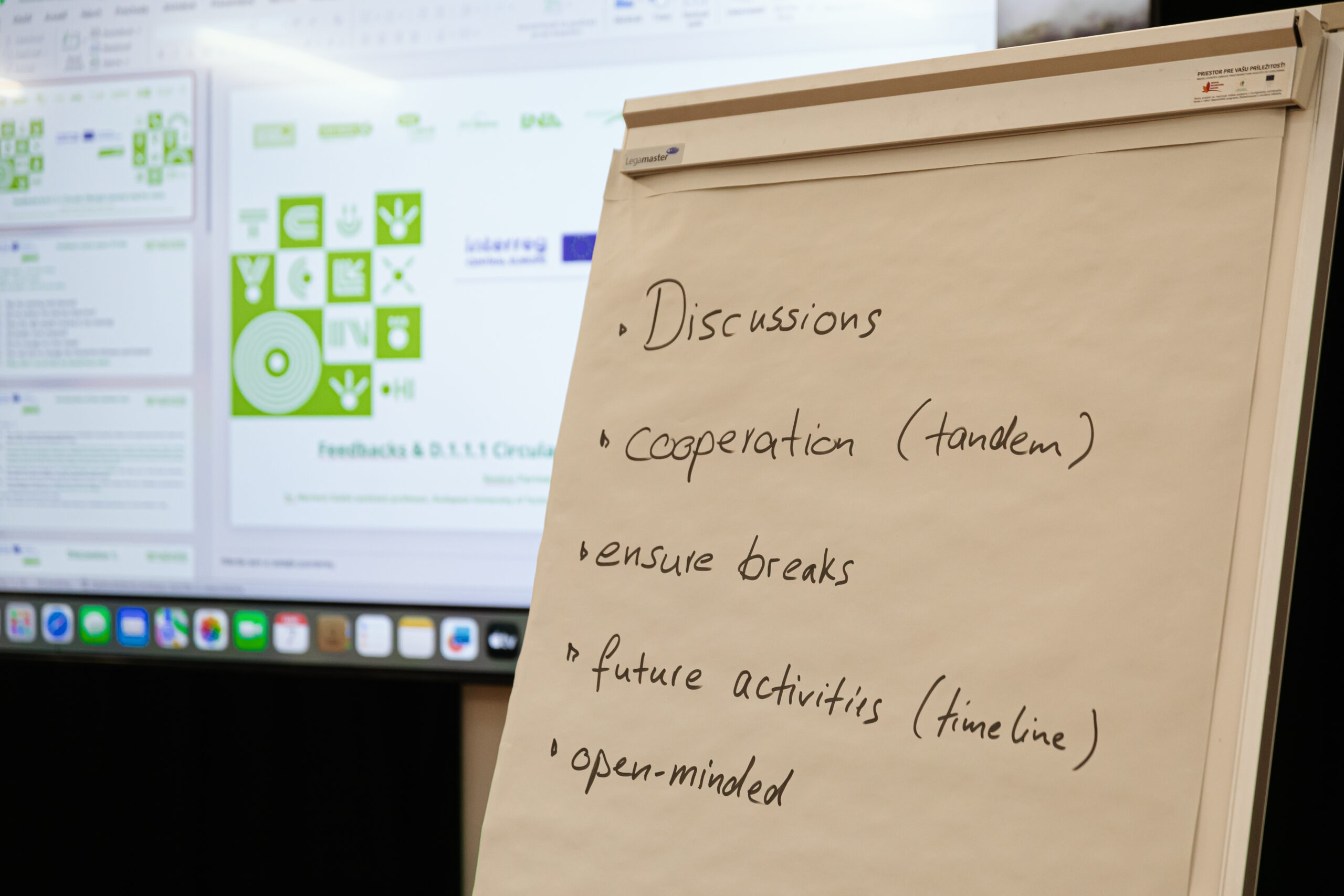Development of the Strategy Framework to enable circular lifestyles in cities
The assessment of political measures, action plans, development plans, strategies and programmes that support circular lifestyles have been carried out in NiCE partner countries (Austria, Czechia, Germany, Hungary, Italy, Poland, Slovakia & Slovenia) as well as in pilot cities, towns (Bologna and Porto-Saragozza district in Italy, Brzeg Dolny in Poland, Budapest and Újbuda district in Hungary, City of Jihlava in Czechia, Graz in Austria, Košice in Slovakia, Ptuj in Slovenia and Würzburg in Germany) by interviewing political stakeholders and conducting desk research. Sustainable consumption patterns and supporting business models that play a role in the circular development of cities, towns have been assessed on an urban level. Partners have analysed the needs and visions of their target groups (cities and initiatives / providers of new business models, existing networks) to identify transnational challenges and potentials. The results provided a profound basis for one of the most important outcomes of the NiCE project – for the Strategy framework to enable circular lifestyles in cities.
By the end of February, a draft document of the Strategy Framework has been developed and sent out for registered participants of the joint, hybrid Transnational Think Tank workshop with the involvement of political stakeholders and partners from the eight participating countries.The workshop took place in a hybrid format on 6 March 2024, back-to-back with the Partner Meeting in Košice. The participants of the workshop included the consortium of NiCE, some associated partners (e.g. networks), representatives from NGOs and policymakers. During the workshop participants had the opportunity to listen to presentations about the political framework conditions and the research conducted in order to support the status quo assessment, the needs analysis of the target groups through the assessment the sustainable consumption patterns, and the circular business models in NiCE pilot cities. Besides the presentations, discussions were held in smaller groups, where the invited participants and experts could express their opinions about the Strategy Framework and discuss the drivers and barriers of circular lifestyles in cities. Participants got familiar with the SWOT analysis about circular lifestyle patterns in partner cities and towns based on the research findings of the consortium partners, followed by a proposal and a discussion regarding the creation of a common statement (Mission Statement) for the project.
The final Strategy Framework for the promotion and establishment of circular lifestyles in cities/city centres thereafter is based on the identified (A) needs and challenges (B) potentials assessed during the analysis of sustainable consumption patterns and supporting business models that play a role in the circular development of cities as well as (C) the joint Think Tank workshop. The Strategy Framework serves as guidance for local and regional public authorities and can be uptaken e.g. by the cities of our pilots. It can be regarded as a living document that we will reevaluate and update in our last period.
Intensive knowledge exchange on how sustainable lifestyles have been established in urban centres
During the first project period partners have jointly developed a Good Practice template and a longlist of innovative solutions for the promotion of circular lifestyles in cities. During the second project period all partners documented Good Practices which will be included in the Virtual Reality Exhibition in the next period.
Monitor tool for the enhancement of circular lifestyles in urban areas
As the NiCE project aims to change the architecture of our consumption through promoting new, sustainable consumption behaviour, we develop solutions suitable for enhancing circular transitions. One of these is the circular lifestyle monitor tool, which helps to quickly analyse status quo, challenges, and potentials for circular lifestyle in cities. Users of the monitor tool would be municipality departments specialized for strategic and/or environmental planning, and city property management. The monitor tool would be beneficial for NGOs and other specialized institutions as well. The tool would enhance the community-based-planning in municipalities by the selection of target for circular lifestyle and definition of concrete measures, indicators.
The monitor tool helps the planning process for the enhancement of circular lifestyles. During the selection of relevant indicators measuring the circular lifestyle in cities, we have defined the following categories to the indicators:
- Circular lifestyle ecosystem (facilities, businesses for circular lifestyles) for situational analysis to define a realistic vision & objectives on the enhancement of the circular lifestyles based on what the settlement has or could have,
- Circular lifestyle actions (actions for promoting circular lifestyle) for demonstrating insights what kind of actions can contribute to the realization of the vision and objectives set up,
- Performance indicators (track specific actions or activities) for measurement,
- Policy interventions (interventions for enhancing circular lifestyle) as special types of actions for the enhancement of circular lifestyles, and finally,
- Result indicators (measure the results from various actions as an aggregate) for the measurement of short-term and long-term effects.
Get prepared for the next phase: Monitoring & Evaluation
As the next phase of NiCE project is dedicated to the development and implementation of pilot projects, partners have elaborated a Monitoring & Evaluation Framework for our pilots based on various assessments. The Framework will be applied in all pilot cities / pilot neighbourhoods to get a baseline before the start of the pilot testing phase.
